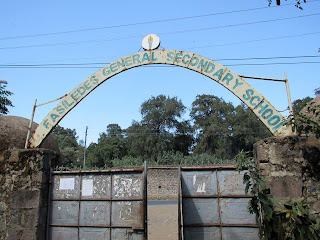We were invited by the Jewish Agency for Israel (JAFI) volunteers to the participate in their Hanukkah celebrations. JAFI prepares Ethiopians in Gonder for immigration to Israel and assimilation upon arrival. On Thursday we went to the synagogue for the menorah lighting. It was packed! There must have been over a thousand people in attendance! The area was teeming with children running around, singing in Hebrew, and trying to get as close as possible to the stage.
The rabbi commenced the festivities and spoke at length about Hanukkah in Amharic. We had the opportunity to meet him after the lighting. He is such a nice man, and Ari and I were able to chat with him a little bit in our broken Hebrew and Amharic. He is from Ethiopia, lives in Israel now, and rotates with other rabbis coming to Gonder for a few weeks at a time over the year. After the rabbi's speech, a short prayer was conducted. The rabbi would say one word at a time in Hebrew and the congregation would repeat after him, and then a member of the community lit the menorah.
The rabbi commenced the festivities and spoke at length about Hanukkah in Amharic. We had the opportunity to meet him after the lighting. He is such a nice man, and Ari and I were able to chat with him a little bit in our broken Hebrew and Amharic. He is from Ethiopia, lives in Israel now, and rotates with other rabbis coming to Gonder for a few weeks at a time over the year. After the rabbi's speech, a short prayer was conducted. The rabbi would say one word at a time in Hebrew and the congregation would repeat after him, and then a member of the community lit the menorah.
A group of students performed a skit on the story of Hanukkah. The skit was also in Amharic so I had to do my best to narrate. The students were great! They all had their lines completely memorized and acted with such passion. Judah Maccabee had a tendency to dramatically turn around and around and preach loudly. King Antiochus trudged around with a large walking stick, and the Syrians wore togas and laurels. The fight scene between the Jewish rebels and Syrian army was certainly the most eventful. There were homemade wooden swords and bows and arrows involved. The children in the crowd grew so excited that they started to stand up, giggling and cheering.
On Sunday we returned to the JAFI community center to help prepare latkes, or levivot in Hebrew. I was assigned to the potato peeling station. There were no vegetable peelers so we had to do it the old-fashioned way and cut the potato skins with knives. It was no easy task! I think that I should stick to baking. I was with a group of girls who were phenomenal though. They were so much faster than me and produced clean potatoes without a shred of skin in sight.
 |
| The peeling station |
After the potatoes were peeled, they were washed and put through a manual machine that grated them. The grated potatoes were mixed with flour, eggs, and salt and shaped into small patties. Finally the latkes were placed in a very large metal pot with palm oil to crisp. At first the latkes weren't sticking and came out like hash browns. We solved the problem by adding more eggs to the mixture, and then the latkes turned out beautifully. All that was missing was applesauce. Before leaving we popped into one of the classrooms to hear the children learning Hanukkah songs.
 |
| Mixing the potatoes, eggs, and flour |
 |
| Frying the latkes |



















